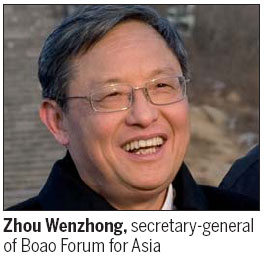Asia needs to 'increase its clout'
Updated: 2013-04-05 07:45
By Sudeshna Sarkar (China Daily)
|
||||||||
Zhou Wenzhong, secretary-general of Boao Forum, unfolds the vision for Regional cooperation
"We should increase our clout," says Zhou Wenzhong, secretary-general of Boao Forum for Asia (BFA).
Zhou, also a former Chinese ambassador to the US, is echoing the "consensus" of participants at the conferences hosted by BFA in different parts of the world - from Paris to Mumbai - as part of its mission to project the Asian perspective. "We" means Asia.
"We are the engine for global growth. We need to work together. We need to do more - that is the common consensus of Asian delegates."
Asian integration is not just between China and India, the two fastest growing economies in Asia.
"We need other countries," Zhou says.
"There is (huge) diversity in Asia. South Asia, Southeast Asia, East Asia - they are all different. We should talk about regional integration. Once we can do that, then we can work towards a Pan-Asian cooperation."
The secretary-general calls the Regional Comprehensive Economic Partnership (RCEP) - envisioned to be the largest free-trade bloc in the world, comprising all the 10 members of the Association of Southeast Asian Nations (ASEAN) plus the six countries with which the group has free trade agreements - a good example of cooperation.

"First ASEAN, then ASEAN+3 (ASEAN plus China, Japan and South Korea), and then ASEAN+6 (ASEAN+3, plus India, Australia, and New Zealand).
"For regional integration, we need new ideas and suggestions. The countries involved need to contact each other and to work out the details to fill the gaps. We don't have a concrete agenda or schedule yet. There's still a long way to go."
The process will not be easy, he warns. "There will be difficulties." He gives an example: "We have increasing protectionism among Asian countries."
Still the task has to be shouldered as "none of the countries can develop on its own". Zhou calls the G20 "a good beginning" for greater cooperation.
Regional cooperation cannot be sustained without financial cooperation, he says. BFA is trying to play a key role in fostering financial cooperation. Its conferences help "governments and financial institutions to get to know each other".
"We point out the direction, resulting in a roadmap for economic cooperation," Zhou says.
BFA has its own framework for greater financial cooperation among Asian countries. It has been elaborated by Zeng Peiyan, BFA vice-chairman and former Chinese vice-premier.
The four-point "roadmap" seeks greater currency cooperation. It recommends countries in East Asia should make the Chiang Mai Initiative Multilateralization - the agreement between ASEAN, China, Japan, South Korea and the Monetary Authority of Hong Kong to strengthen the region against increased risks and challenges in the global economy - more operable, and enhance the capacity of economic surveillance and crisis rescue and prevention.
The second suggestion is establishing multiple financing channels for developing infrastructure, like bilateral or multilateral infrastructure investment funds or other forms of investment and financing institutions. These could be funded by governments, businesses and financial institutions with energy, transportation, telecommunications and municipal development as the priority areas.
Zeng's framework also suggests improving Asia's capital markets. While developing domestic capital markets, cross-border financial transaction and clearance mechanisms should be improved. There should be financial regulatory cooperation and greater connectivity among Asian capital markets. Regional rating agencies should be set up to provide financial services to these markets.
The final step is expanding the use of domestic currencies in the region. By using more local currencies for denomination, settlement and value reserve, Asian countries could effectively reduce exchange rate risk and cost of transaction. This would boost intra-regional trade and investment. Governments should provide more policy support to bilateral currency swap agreements and agreements on settlement in general trade with local currencies. This would scale up currency swap and encourage financial institutions to provide more convenience to local currency settlement.
"Zeng's four suggestions provided a framework," Zhou says. "It needs to be perfected. (Zeng) mapped out the issues and (spoke about) increased currency cooperation. When the conditions are ready, it would have a broader base. China is starting to do more in this regard."
sarkar@chinadailyapac.com
(China Daily 04/05/2013 page15)

 Li Na on Time cover, makes influential 100 list
Li Na on Time cover, makes influential 100 list
 FBI releases photos of 2 Boston bombings suspects
FBI releases photos of 2 Boston bombings suspects
 World's wackiest hairstyles
World's wackiest hairstyles
 Sandstorms strike Northwest China
Sandstorms strike Northwest China
 Never-seen photos of Madonna on display
Never-seen photos of Madonna on display
 H7N9 outbreak linked to waterfowl migration
H7N9 outbreak linked to waterfowl migration
 Dozens feared dead in Texas plant blast
Dozens feared dead in Texas plant blast
 Venezuelan court rules out manual votes counting
Venezuelan court rules out manual votes counting
Most Viewed
Editor's Picks

|

|

|

|

|

|
Today's Top News
Boston bombing suspect reported cornered on boat
7.0-magnitude quake hits Sichuan
Cross-talk artist helps to spread the word
'Green' awareness levels drop in Beijing
Palace Museum spruces up
First couple on Time's list of most influential
H7N9 flu transmission studied
Trading channels 'need to broaden'
US Weekly

|

|







